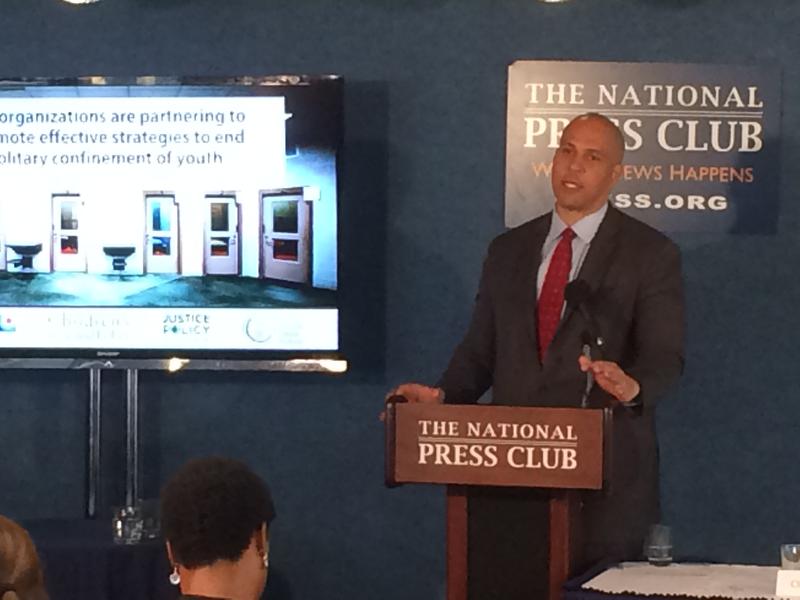
Time is running out for a bipartisan Senate effort to address the problem of mass incarceration in federal prisons.
The straightforward proposal would reduce the size of the federal prison population by reducing the penalty for some crimes.
The bill could give thousands of people in federal prison, many of them for drug-related charges, a chance at a shorter sentence or being released from prison.
But the rules of Washington gridlock apply, and now the Senate has just two months and a long to-do list that may or may not include the bill.
That's left New Jersey Senator Cory Booker and New York Senator Charles Schumer, who have made criminal justice reform a priority, scrambling to win over colleagues and convince Republican leadership to allow a vote. It’s a test of their effectiveness in Washington.
“There is momentum and progress being made," Booker said, "but it’s hard to get legislation passed.”
Booker said he was surprised at the broad political support for reducing mass incarceration when he first got to Washington three years ago.
“There was coalitions that are rare," he said, "from the Christian conservatives to fiscal conservatives to liberals to libertarians.”
Anti-tax advocates like Grover Norquist, president of Americans for Tax Reform, said mass incarceration costs billions and didn’t make the country safer. Republicans like Utah Senator Mike Lee worried that the government had too much power.
As one of only two black senators, and as the former mayor of Newark, Booker knew that the nation’s laws take a large toll on minorities.
“There’s no difference between blacks and whites for using drugs or dealing drugs — in fact, young white men have a little bit higher rates," Booker said. "But blacks are arrested almost four times more likely to be arrested for drug crimes than whites are.”
So Booker, a Democrat, joined Republicans to support a bill that would reduce sentences for people convicted of drug crimes. More than 11,000 federal prisoners could get a new hearing in front of a judge and ask for their sentence to be shortened.
But the bill hasn’t moved since the Senate Judiciary committee approved it in October.
Among the obstacles are traditional tough-on-crime Republicans like Arkansas Senator Tom Cotton, who said the bill will release dangerous felons from prison.
“Drug trafficking is not non-violent as the bill’s proponents claim," Cotton said in a Senate floor speech in February. "It’s built on an entire edifice of violence, stretching from the narco-terrorists of South America to the drug-deal enforcers on our city streets.”
Other obstacles come from lobbyists and advocates on both sides of the issue who are lining up to insert their pet provisions in the bill.
One such provision — based on the Latin term mens rea, or “guilty mind” — seems to be a particular sticking point. It means prosecutors would have to prove a defendant knew the act was illegal to convict them of a crime.
Supporters of the provision, such as the lobbyists at the conservative Heritage Foundation, say there’s too many crimes on the books. But Democrats like Massachusetts Senator Elizabeth Warren say mens rea reform is really about letting white collar criminals off the hook.
“It’s all part of a rigged game in Washington,” Warren said on the Senate floor.
Prosecutors would have to prove that corporate officials who engage in complicated financial or regulatory violations knew their actions were illegal in order to convict them of a crime.
“Crimes from everything from wire fraud to mislabeling prescription drugs,” she said.
Warren and other Democrats threatened to kill the bill if mens rea reform is added. So far, it’s not in there.
Booker, Schumer and their Republican allies say they want to keep sentencing reform separate, and Schumer said he’s optimistic about the process. They’ve been working since October — in conversations on elevators, during meals or at the Senate gym — to get more Senators to sign on. They’re also offering compromises.
For instance, Texas Republican John Cornyn recently announced that federal inmates convicted of a violent felony will no longer be eligible for a shorter sentence if the bill is passed.
“We ensured that violent criminals, and those who have been hardened by a life of crime, will stay in prison while addressing the ballooning prison population," Cornyn said.
The compromise won the backing of the National District Attorneys Association, giving some protection to lawmakers from charges they’re going soft on crime.
Thirty-seven senators are now supporting the bill, up from the ten original sponsors. It needs a majority to pass — and as many as 60 members to force a vote.
Some advocates say the compromise waters down the bill. They want to wait until the next Congress — especially with the possibility that Donald Trump’s Republican presidential nomination could hand the Senate to Democrats next year.
Booker disagrees. He said there’s no guarantees in politics.
“I once said that to a very seasoned man — I think it was Dick Durbin — about, ‘Well, maybe we’ll win the Senate next year. We can get a better thing.’ And he looked at me and he goes, ‘My experience always is if you have a time to strike, strike now.' ”
Senate Majority Leader Mitch McConnell, a Kentucky Republican, hasn’t said when he’ll allow the full Senate to take up the sentencing bill. McConnell wants the Senate to pass spending bills first. Congress takes a seven-week recess in mid-July.
Supporters say they’ll have to prove the bill can pass quickly before McConnell will allow it on the floor. And then it faces another uphill battle in the House.
